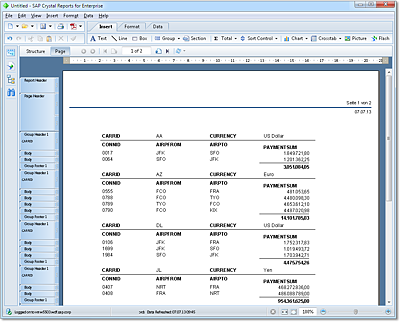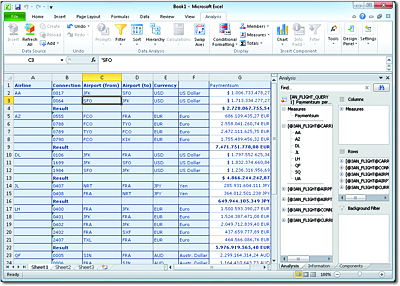9.2SAP BusinessObjects Portfolio
The SAP BusinessObjects portfolio provides numerous tools for the different levels of reporting. Each tool is used for different application cases and has specific advantages and disadvantages. A detailed description of all tools is beyond the scope of this chapter, so we’ll only categorize the tools and give you a general overview here.
In Table 9.1, the tools of the SAP BusinessObjects portfolio are subdivided into three categories: reporting, data analysis, and data exploration.
|
Reporting |
||
|---|---|---|
|
SAP Crystal Reports |
SAP BusinessObjects Analysis, edition for Microsoft Office |
SAP Business Explorer (SAP BEx) |
|
SAP BusinessObjects Web Intelligence |
SAP BusinessObjects Analysis, edition for OLAP |
SAP Lumira |
|
SAP BusinessObjects Dashboards |
||
|
SAP BusinessObjects Design Studio |
||
Table 9.1Overview of the SAP BusinessObjects Portfolio
Reporting
The reporting tools will help you gather and format data. The most commonly known tool used for this purpose is probably SAP Crystal Reports with which you can create, format, and print reports with precise pixel values. This tool is the de facto standard for formatted reporting.
Figure 9.3 shows the preview of a report created with SAP Crystal Reports that breaks down the sales of the airlines by connection.
Figure 9.3Report in SAP Crystal Reports
SAP BusinessObjects Web Intelligence can also be used to generate formatted reports. However, this tool doesn’t provide the same scope of formatting and printing options as SAP Crystal Reports. Web Intelligence, however, is better suited if end users from the individual departments want to create their own reports (self-service BI).
Dashboards summarize important key figures for decision makers. SAP BusinessObjects Dashboards provides a series of components that can be used to create appealing dashboards. Using these dashboards, you can visualize what-if scenarios as well as use them offline, if necessary. Although SAP BusinessObjects Dashboards is still maintained and partially improved, SAP BusinessObjects Design Studio is the strategic tool recommended by SAP for creating dashboards (described briefly in the next section).
Data Analysis
This brings us to the tools for data analysis. With SAP BusinessObjects Analysis, Edition for Microsoft Office, you can analyze multidimensional datasets interactively and based on Microsoft Excel. This makes the tool particularly useful for employees in individual departments who are often well-practiced with Excel. SAP BusinessObjects Analysis, edition for Microsoft Office, is similar to the SAP BEx Analyzer. However, SAP BusinessObjects Analysis, edition for Microsoft Office, provides more functions and a better user experience. In addition to Excel, data also can be embedded in Microsoft PowerPoint.
Figure 9.4 shows the formatted view of a SAP BW query using SAP BusinessObjects Analysis, edition for Microsoft Office.
Figure 9.4SAP BusinessObjects Analysis, Edition for Microsoft Office
The web-based variant for analyses of multidimensional datasets is SAP BusinessObjects Analysis, edition for OLAP. Alternatively, you can also analyze multidimensional datasets in SAP BusinessObjects Design Studio.
SAP BusinessObjects Design Studio is a tool used to create analytical applications and dashboards. Using SAP BusinessObjects Design Studio, you can create pixel-perfect analytical applications and dashboards. This tool provides a variety of charts and comprehensive theming. In addition, it also supports mobile scenarios.
Figure 9.5 shows the design of a simple analytical application in SAP BusinessObjects Design Studio.
Figure 9.5SAP BusinessObjects Design Studio
Data Exploration
A special case of data analysis is data exploration (i.e., the interactive analysis of a dataset). For data exploration, end users need tools that can be used intuitively and provide high-quality visualizations. The SAP BusinessObjects portfolio includes two tools: SAP Business Explorer (SAP BEx) and SAP Lumira. Although SAP BEx is still maintained and partially improved, SAP recommends SAP Lumira as the strategic tool for data exploration.
For more detailed information, see the following information sources:
-
The SAP Community Network and SAP Service Marketplace provide full information on the various products of the SAP BusinessObjects portfolio and their roadmaps.
-
SAP NetWeaver BW and SAP BusinessObjects by Heilig, Kessler, Knötzele, John, and Thaler-Mieslinger (SAP PRESS, 2012) provides comprehensive descriptions of the various tools.
-
You can find useful information on the web, for example, at http://blogs.sap.com/analytics/2014/06/25/run-simple-convergence-of-the-sap-businessobjects-bi-product-portfolio/.


